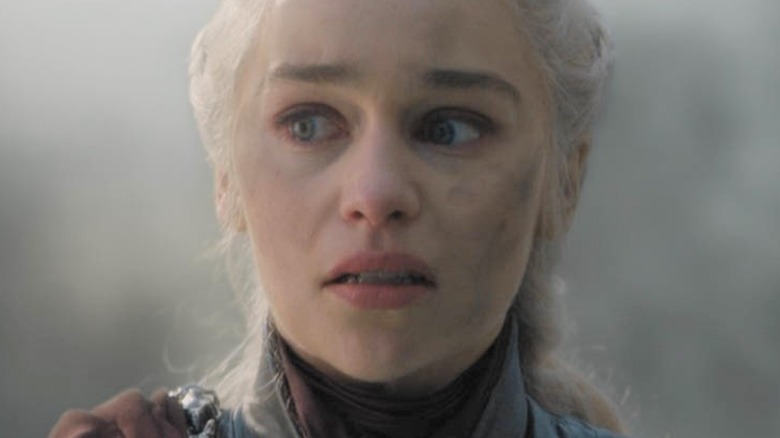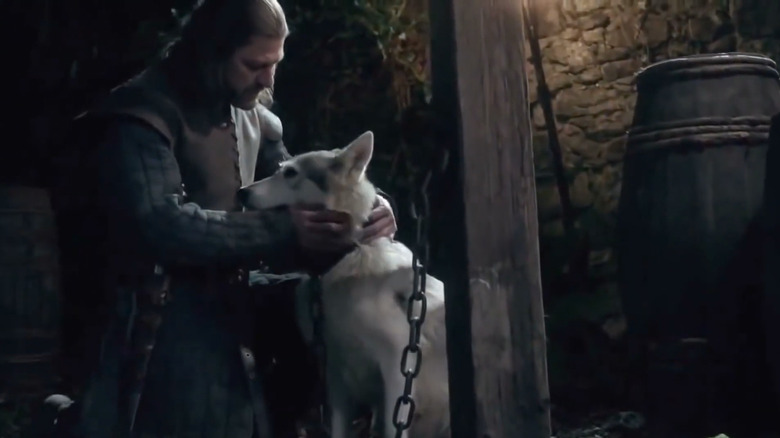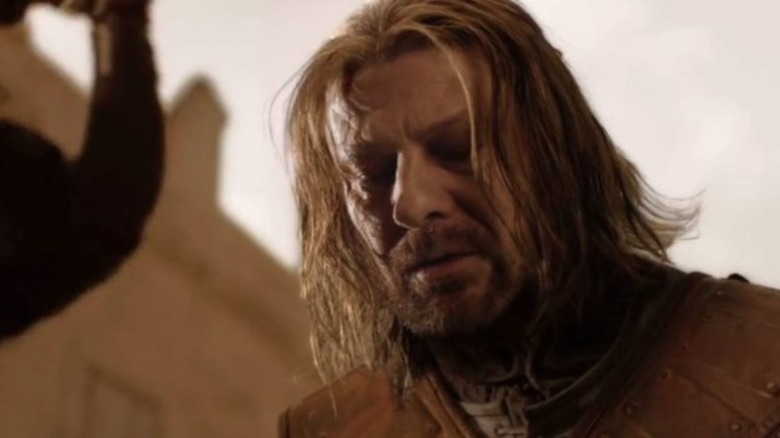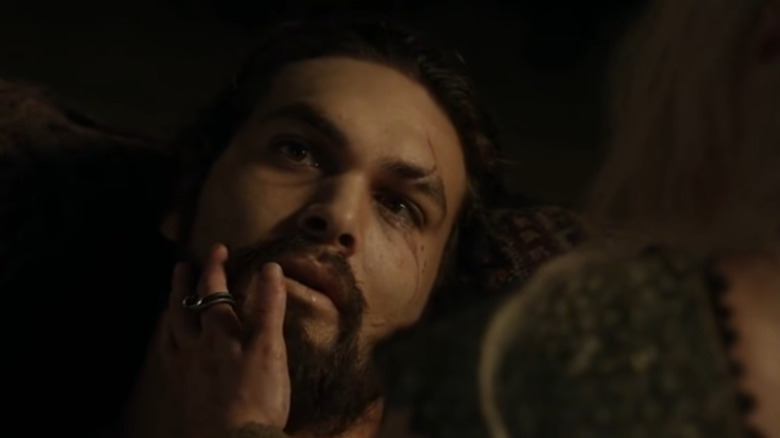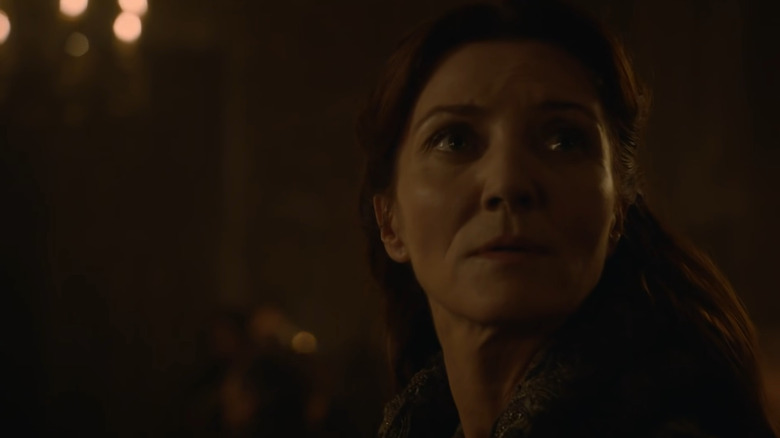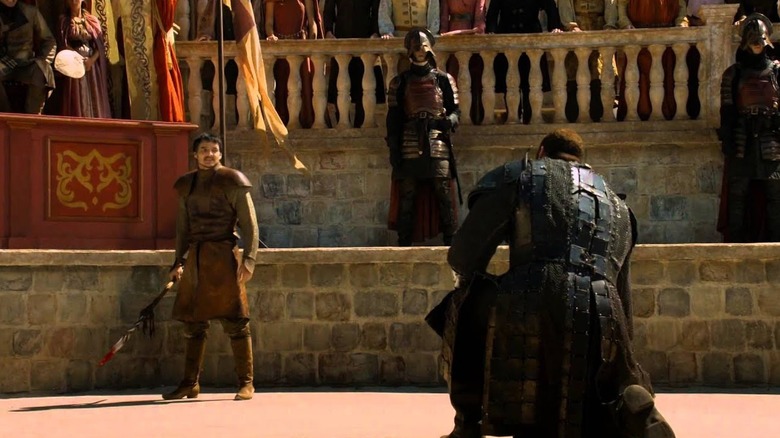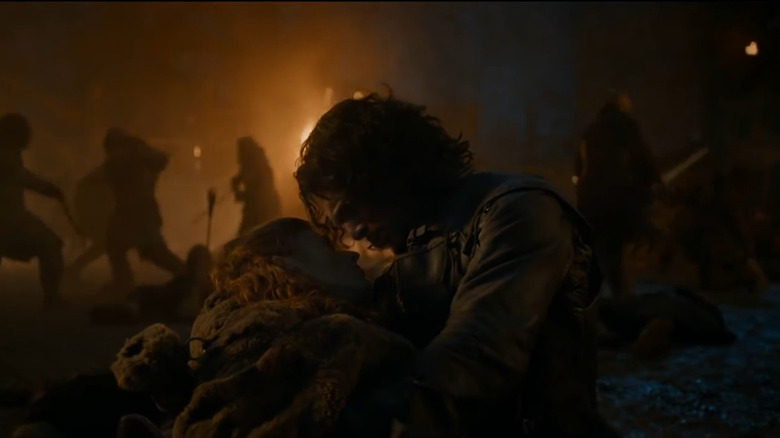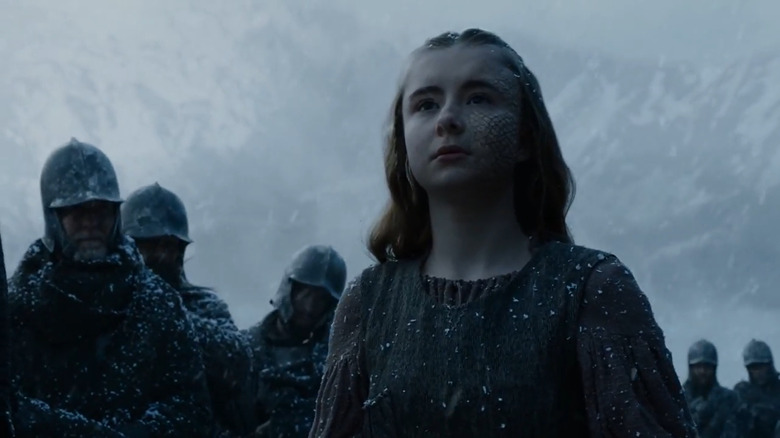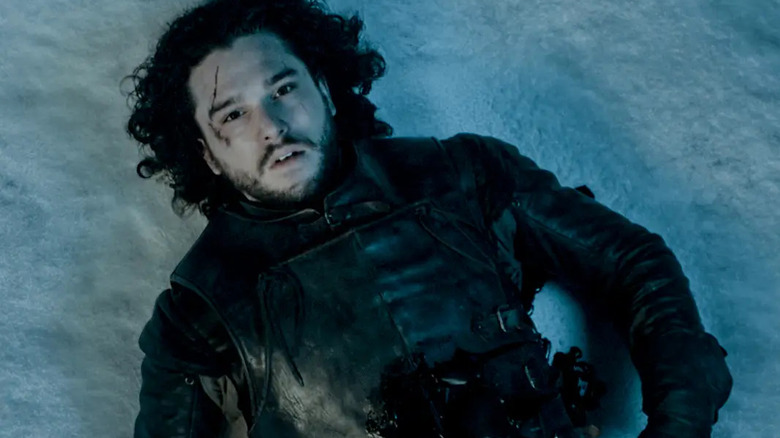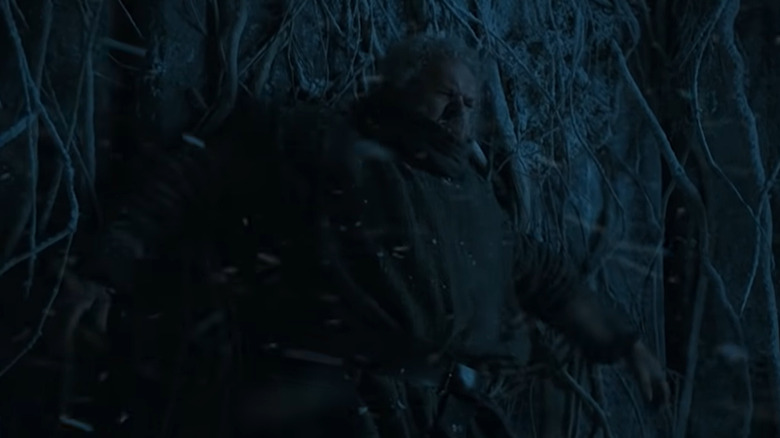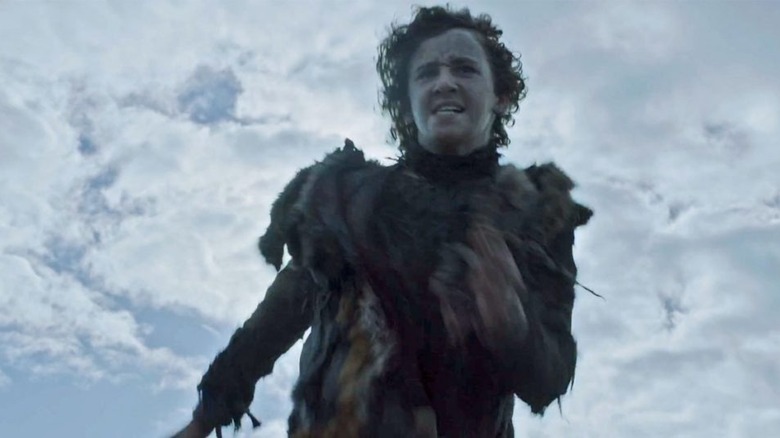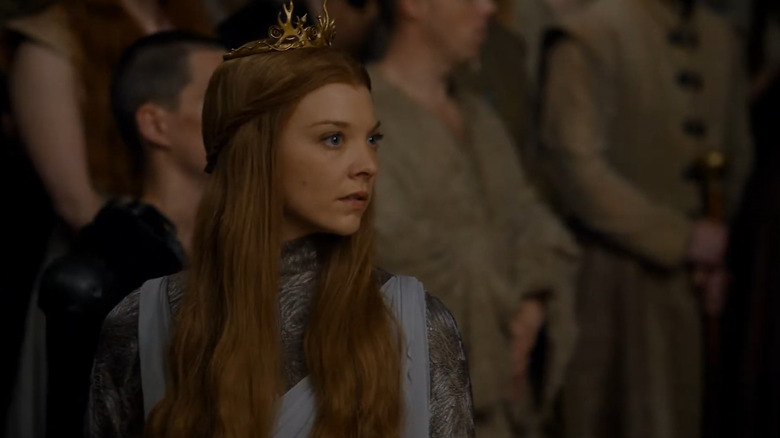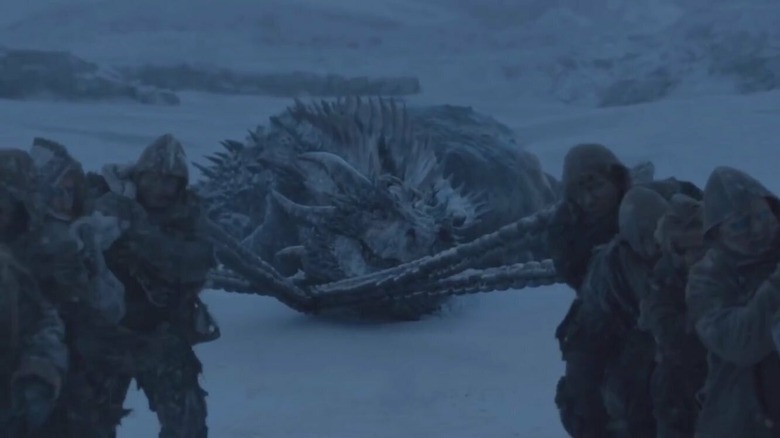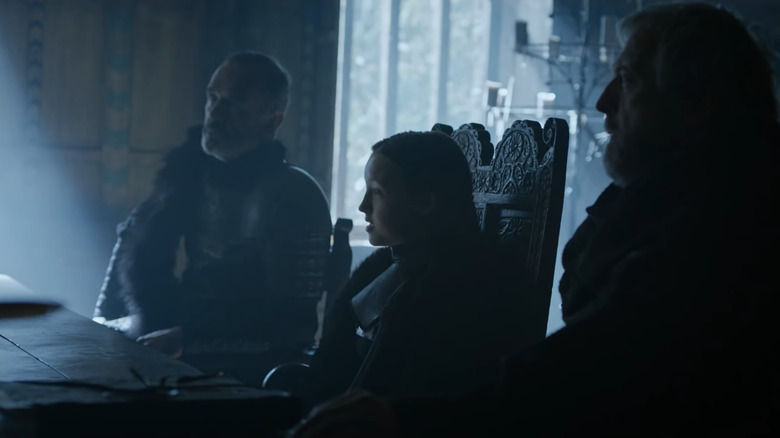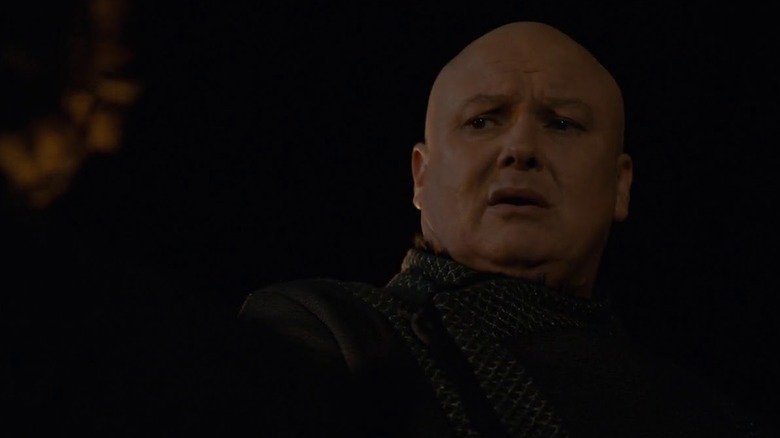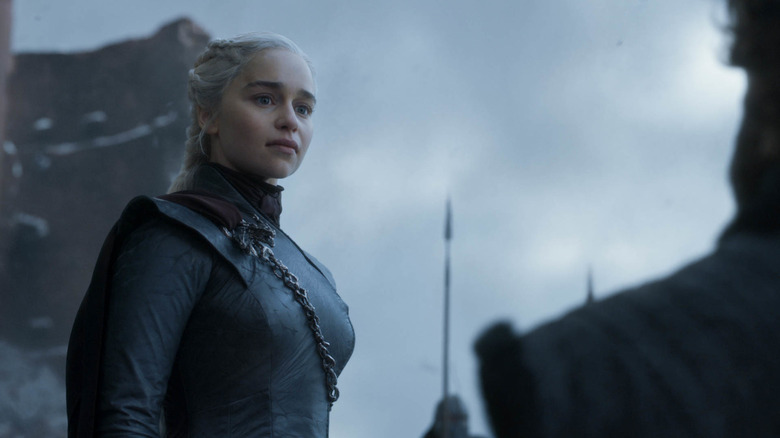The Most Devastating Game Of Thrones Deaths
"Game of Thrones" never pulled its punches, even when it came to its most beloved characters, and fans of the HBO fantasy series said reluctant goodbyes to dozens of familiar faces throughout its eight-season run. Still, despite "valar morghulis" — translated "all men must die" — being one of the most memorable catchphrases of the series (meaning fans knew not to get too attached), there were certain deaths that hit harder than others. After all, we wouldn't have tuned in for season after season of the brutal show if we didn't care about the people in it, even if we knew a number of them would likely meet a tragic end at some point.
Some of the "Game of Thrones" deaths that hit us the hardest were due to how close we felt to the characters, while others just seemed particularly mean within the context of the show. It's not that we necessarily needed these characters to stick around forever, but did they really have to go out like that? From spiteful beheadings to shocking betrayals, here are the "Game of Thrones" deaths that hurt us the most. (Warning — there are major spoilers below.)
Lady the direwolf
The first of many horrifying deaths to come on "Game of Thrones" wasn't a person at all but rather a direwolf — in other words, the Stark family's fantasy version of a pet dog. Ned Stark (Sean Bean) finds a pack of direwolf pups in the show's first episode and gives one to each of his children, who in turn bond with their new canine companions. To his eldest daughter, Sansa (Sophie Turner), Ned entrusts a white pup with gray markings that she names Lady.
Lady becomes a constant companion to Sansa, and she remains well behaved throughout her short time on the series. However, when Arya Stark's (Masie Williams) direwolf, Nymeria, bites the spiteful and cruel Joffrey Baratheon (Jack Gleeson) in defense of Arya, Joffrey's mother demands that blood be spilled in retribution. But since Arya told Nymeria to run away immediately after the biting, Cersei decides that Lady should be executed in her place. Ned himself is the one who reluctantly carries out the sentence in "The Kingsroad," trying to be as merciful as possible. But no matter how nicely you do it, there's no way to make killing a young girl's dog not hurt.
Ned Stark
While readers of George R. R. Martin's "A Song of Ice and Fire" series knew what they were signing up for with "Game of Thrones," newcomers to the show were in for quite a shock when the apparent lead character of the series, Ned Stark, was beheaded in "Baelor," the penultimate episode of the first season. Up until that point, Ned had served as the show's moral compass, always trying to do the right thing even when it was hard and attempting to hold everyone around him to a high standard.
Unfortunately for Ned, "Game of Thrones" isn't the type of show where that sort of honorability tends to pay off. Ultimately, the hero finds himself tricked into confessing to treason — even though he's innocent — which gives sadistic child king Joffrey Baratheon an excuse to renege on his promise to spare Ned's life and have him executed instead.
Even for viewers who knew Ned's death was coming from reading the books, it was a devastating scene, especially since his daughters were both there to witness Ned's final moments. But even more than the brutality of the death, the moment served as a gut-punch for anyone who'd assumed that this was the type of show where good guys tend to win and bad guys tend to lose. Seeing Ned fall while Joffrey remained in power was enough to put that naive hope to death for good.
Khal Drogo
Introduced as a gruff and ruthless warrior king who was granted a reluctant young bridge as a way for her brother to secure political power, Khal Drogo (Jason Momoa) hardly endeared himself to viewers right off the bat. It was immediately clear that his new wife, Daenerys (Emilia Clarke), was terrified of him, and he didn't do much to make her feel comfortable in her unfamiliar new surroundings. However, over the course of the show's first season, the two warmed up to one another and eventually fell in love.
Unfortunately, it isn't long before the honeymoon period comes to a brutal end for the newlyweds, when Drogo is minorly injured in a fight. Although Drogo easily prevails, the small cut becomes infected, and he falls seriously ill. Desperate to heal him, Daenerys begs a woman Drogo recently took as a slave to use her magic to save him. The woman agrees but betrays her, with the ritual she performs resulting in the stillbirth of Daenerys and Drogo's baby and Drogo surviving only in a catatonic state. Realizing Drogo will never recover, a heartbroken Daenerys mercy kills him by smothering him with a pillow. Especially combined with the loss of Daenerys' much-anticipated child, the death of Drogo was heartbreaking to watch, and it was felt by Daenerys throughout the rest of the series.
The Stark family at the Red Wedding
When talking about major "Game of Thrones" deaths, the conversation never gets far before someone inevitably brings up the Red Wedding and for good reason. Throughout the second and third seasons of "Game of Thrones," Robb Stark (Richard Madden) gathers his armies, intent on seeking revenge against the Lannisters for killing his father. During that time, a marriage is arranged between Robb and a daughter of Walder Frey (David Bradley) in exchange for safe passage through the Frey family's land. But after Robb agrees to Frey's terms, he falls in love with a woman named Talisa (Oona Chaplin) and marries her in secret. As a result, the Frey soldiers withdraw from Robb's army, much to the dismay of Robb's mother, Catelyn (Michelle Fairley).
To win them back, Robb proposes that his uncle marry Frey's daughter instead, thinking it's still a good match for the Freys. The elderly Frey agrees, but after the wedding, the doors to the banquet hall are locked, and Catelyn realizes it's a trap. But by then, it's too late, and Robb, Catelyn, Talisa, and all of the Stark soldiers are slaughtered. Adding insult to injury, outside the banquet hall, Frey's soldiers even kill Robb's direwolf, Grey Wind, as his youngest sister looks on helplessly from her hiding place. Seeing so many of the Stark family cut down all at once is one of the most gutting moments in the show, made that much worse by Robb having to watch his wife — and unborn child — die first, then Catelyn watching her son get killed, and Arya watching Grey Wind get shot.
Oberyn Martell
The introduction of Oberyn Martell (Pedro Pascal) at the beginning of the fourth season of "Game of Thrones" proved one of the show's more popular character introductions. The charismatic Oberyn was instantly likable, easily charming both the people of King's Landing and viewers alike. And we only became more firmly Team Oberyn when he volunteered to fight as the champion for Tyrion Lannister (Peter Dinklage) after the latter was falsely accused of assassinating Joffrey Baratheon and demanded trial by combat.
Unfortunately, that trial does not go the way anyone planned or hoped.
The reason that Oberyn volunteered for Tyrion, whom he didn't know particularly well, was because he had a personal vendetta against Cersei's own champion — Gregor Clegane (Hafþór Júlíus Björnsson), aka the Mountain. Years before, the Mountain had slaughtered Oberyn's sister and her children in a particularly heinous fashion, leaving Oberyn hungry for revenge. During their fight, Oberyn, a seasoned and skilled warrior, manages to get the upper hand, but instead of quickly finishing off his opponent, he resolves to make him suffer, which turns out to be his downfall.
As Oberyn rants angrily at the Mountain, determined to make him take responsibility for what he's done, the Mountain seizes his opportunity and knocks Oberyn off his feet. In one of the most brutal deaths on the show, the Mountain gouges out Oberyn's eyes with his thumbs before crushing his head with his bare hands. Making the moment even worse is the knowledge that Oberyn's defeat means that Tyrion will be found guilty, piling yet another injustice on to an already deeply upsetting moment.
Ygritte
If we're being honest, we knew from the beginning that a romance between Stark bastard Jon Snow (Kit Harington) and the wildling Ygritte (Rose Leslie) was likely doomed. After all, Jon's oath to the Night's Watch pitted him against the self-proclaimed Free Folk. Still, we couldn't help but root for them as they gradually fell in love, even as they remained aware that the odds were against them. And eventually, things seemed to be looking up, as Jon was accepted as one of the wildlings, putting the two of them on the same side. But ultimately, their alliance couldn't last, as Ygritte realized Jon's loyalty was still with the Night's Watch.
At the end of Season 3, Jon turns from the wildlings to return to the Wall, realizing that this makes him and Ygritte enemies again, even though they still love each other. So by the time the wildlings finally invade Castle Black in Season 4 in "The Watchers on the Wall," viewers knew a confrontation between the two must be near at hand. Still, we were hardly prepared when Ygritte's hesitation to shoot Jon during the battle resulted in her getting shot instead, causing her to die in Jon's arms after telling him she wished they'd stayed in the cave where they made love. We wished they'd stayed in that cave too.
Shireen Baratheon
Some characters break our hearts when they die not because of how much we loved them but simply because they deserved better than what they got. Such was the case with Shireen Baratheon (Kerry Ingram), the young daughter of Stannis (Stephen Dillane), who met her inflammatory fate at the hands of her own parents. We meet Shireen as a kind and precocious young girl with severe scarring on her face thanks to a grayscale infection when she was younger. Her closest friend is Davos Seaworth (Liam Cunningham), Stannis' right-hand man, who has a soft spot for the child and views himself as her protector.
Maybe we should've known something was afoot when Stannis sent Davos away on a supply run that anyone could have done. But what comes next makes Stannis' intentions appallingly clear. Convinced by the witch Melisandre (Carice van Houten) that he must make a sacrifice of kingsblood in order to appease the gods and win the Iron Throne, and in light of his belief that he himself is the true king, Stannis decides to sacrifice his only child. Not only does Stannis sacrifice Shireen but he does so in a truly horrific way, burning her alive at the stake. It's one of the hardest-to-watch scenes in all of "Game of Thrones," seeing the innocent young child plead with her parents as she dies an unimaginable death. Later, when Davos realizes what Stannis did while he was gone, his reaction only serves to make us live through the pain of Shireen's death again.
Jon Snow
While it may seem like cheating to put a character on this list who doesn't actually stay dead, that didn't make his demise any less devastating when it happened. Since the beginning, "Game of Thrones" followed the members of the Stark family, and even after the loss of Ned, Robb, and Catelyn, it still felt like the remaining Starks should be untouchable. Plus, it seemed like Jon Snow was being set up to be the ultimate hero of the story, so of course we expected him to make it to the end.
So imagine our shock when Jon was assassinated by his fellow brothers of the Night's Watch at the end of Season 5. Although they had once put their faith in Jon as commander, they'd grown disillusioned with his leadership, especially thanks to his affection for the wildlings. Under the guise of telling Jon his long-lost Uncle Benjen has returned, his brothers in the Night's Watch lure him into the courtyard of Castle Black, where they take turns stabbing him while solemnly stating that what they do is "for the Watch." Jon is later resurrected in Season 6, but the moment of his death — and especially the wounded look in his eyes as he realizes the depth of his brothers' betrayal — is still tremendously hard to watch.
Hodor
Most of the characters on "Game of Thrones" who remained central to the story for multiple seasons were fighters, nobles, or a bit of both. But that wasn't the case for Hodor (Kristian Nairn), the gentle giant who served as the legs for the paralyzed Bran Stark (Isaac Hempstead Wright). Although he was an adult, Hodor was always presented as having the mind and spirit of a child, getting easily fascinated or terrified in turn with all the wondrous things happening in Westeros. Through his ability to Warg, Bran was sometimes able to possess Hodor, using his body to defend his companions, even though Hodor himself was afraid. So when he met his fate in Season 6's "The Door," it was absolutely devasating.
When Bran, Hodor, and their companions become trapped north of the Wall, it seems as all hope is lost. With an army of wights in hot pursuit, our heroes flee the lair of the Three-eyed Raven, escaping through a tunnel and shutting a door behind them. Unfortunately, in order to keep Bran safe, someone has to hold the door, a job which falls to Hodor. Adding heartbreak and tension to the scene is the fact that Bran is still entrenched in visions of the past, including one of a young Hodor, back when he was called Wylis. In his vision, Bran watches in horrified realization as the young Wylis collapses on the ground, repeating "hold the door" until the words all merge into one, which is the only word he can ever say moving forward.
Seeing Hodor's origin story unfold in the past while his body was ripped apart in the present was a moment of jaw-dropping storytelling. However, it's also a tremendous tragedy as we realized that the monosyllabic character that we'd loved for so many seasons had been shaped by the trauma of his own death ever since he was a child.
Rickon Stark
While most of the members of House Stark got quite a bit of screen time on "Game of Thrones," the same can't really be said for youngest son Rickon (Art Parkinson), who was toted along with Bran early on in the show, only to be taken prisoner by Ramsay Bolton (Iwan Rheon). Still, just by the nature of being a Stark, we couldn't help but feel a fondness for Rickon and hope that he might someday be reunited with his family. This very nearly happened before the Battle of the Bastards, but of course, "Game of Thrones" was incredibly stingy when it came to doling out happy family reunions.
When Jon goes to meet with Ramsay before the battle, the psychopathic villain leads him to believe that he's willing to release Rickon. But nothing Ramsay's done up until this point has been benevolent, and this is no different. Instead of allowing Rickon to cross safely to Jon, Ramsay instructs the teen to run across the open field while Ramsay shoots at him with a bow and arrow, like he's hunting game. Knowing his odds are slim, Rickon does his best to reach his brother as Jon also races toward him, but Ramsay's arrow finds its target at the last second, and Rickon is struck down before Jon's outstretched fingers can grasp ahold of him.
We can't say that the loss of Rickon Stark left that much of a hole in the fabric of "Game of Thrones," but considering how much the Stark family had lost by that point and how desperately it felt like they needed a win, Ramsay's cold-blooded murder of Rickon stood out as particularly cruel.
Margaery Tyrell and the others in the Sept of Baelor
The prolonged sequence that opens the Season 7 episode "The Winds of Winter" is perhaps one of the most beautiful and moving sequences in all of "Game of Thrones," but it comes at a heavy cost. For much of the beginning of the episode, there's no dialogue at all as various parties prepare for the trials of Loras Tyrell (Finn Jones) and Cersei Lannister (Lena Headey). But although Loras' trial proceeds as planned, something is amiss when it comes time for Cersei's — she's not there. Of course, the quick witted Margaery Tyrell (Natalie Dormer) realizes right away that something is wrong and that Cersei wouldn't miss her own trial unless she had something awful in mind for those who might convict her. But by then it's too late, and Cersei's minions light the wildfire under the Sept of Baelor, killing everyone inside, including Margaery and Loras.
It's honestly a brilliant moment for Cersei and a flawlessly executed bit of storytelling, but it still hit hard when we realized that the smart and savvy Margaery wasn't going to be able to maneuver her way out of the trap that Cersei had set. There aren't a lot of characters in "Game of Thrones" who could hold their own against Cersei, but the Tyrrell women certainly gave her a run for her money. And while Loras never managed to make quite the same impression on our hearts as his sister, it still felt like a deeper cut of the knife watching him be humiliated and mutilated at his trial, only to then die at Cersei's hands. As if that wasn't devastating enough, after King Tommen (Dean-Charles Chapman) comprehends that his mother has killed his wife, he steps out a window, ending the life of perhaps the only Lannister who cared more about people than paying his debts.
Viserion the dragon
There's an unwritten rule in most shows — even the most brutal — that people are fair game, but animals are off limits. This feels doubly true when it comes to magical endangered species like dragons. But apparently "Game of Thrones" didn't get the memo, as evidenced by its habit of regularly killing puppies (er, direwolves) and, eventually, even a dragon. The awful moment comes in the Season 7 episode "Beyond the Wall," which sees Jon Snow lead a mismatched party of warriors north, hoping to capture a wight in order to convince Cersei to lend her armies to the battle against the undead.
Of course, this plan relies on the group actually finding a wight first, and since wights tend to travel in packs, our heroes soon find themselves enmeshed in battle. As their expedition fights desperately for their lives, all seems lost until Daenerys arrives with her dragons to turn the tide. This isn't the first time we've seen Daenerys — along with her reptilian trio of Drogon, Rhaegal, and Viserion — turn a battle around, and we're prepared for the same thing to happen. But everything goes sideways when the Night King (Vladimir 'Furdo' Furdik) hurls a spear and kills Viserion, sending him tumbling into the icy water below (and later resurrecting him as a wight). We've been so braced for a member of Jon's group to die, it never even occurred to us that we may lose a dragon. And when there are only three of a species left in the entire world, the loss of one feels incalculable.
Lyanna Mormont
Some characters barely even need any screen time to etch themselves firmly onto our hearts, and there's probably no better example of this than Lyanna Mormont (Bella Ramsey). The pre-teen head of House Mormont, Leona had both wisdom and bravery that far surpassed her years, possessing the ability to deliver stirring speeches that wound up saving the day for Jon Snow on more than one occasion. All viewers needed was one impassioned speech from the tiny spitfire, and we too would have followed her into battle.
But Westeros is a cruel world for children, women, and warriors, and to be all three at once is a lot to overcome, even for a character as strong as Lyanna. After surviving all the way to the final season, Lyanna is ultimately killed by a wight giant during the Battle of Winterfell, who crushes the small girl after it breaks through the gates of Winterfell. Lyanna manages to take out the wight with her dragonglass dagger right before she dies, giving her one final victory, but it's not enough to save her. It's never pleasant in any show to see a child die, especially one filled with so much life, but losing Lyanna Mormont was particularly rough when all we wanted to do as members of the audience was protect her.
Varys
While the enigmatic Varys (Conleth Hill) was never a particularly charming figure on "Game of Thrones," he still managed to endear himself to us over the course of eight seasons thanks to his sharp mind and willingness to cut right to the truth of a situation. Also known as the Spider, thanks to his ability to weave a complex web of informants, Varys always seemed to know what was going on in every corner of Westeros, and he had a keen sense for being able to see how seemingly unrelated events might all come together and what that might mean for the course of political power in the Seven Kingdoms. Varys may not have had the honorable reputation of Ned Stark, but he followed his own moral code and consistently strove to do what he felt was best for the people of the realm.
This code is what leads him to eventually sever his allegiance to the Lannisters and pledge his loyalty to Daenerys Targaryen, and later, to betray her by sending out letters informing the lords of the Seven Kingdoms of his belief that Jon Snow is the true heir to the Iron Throne. Each time, Varys is motivated by the information he's collected and his firm commitment to create a peaceful and flourishing Westeros. But of course, when Daenerys learns of his betrayal — informed by Tyrion, Varys' best friend — she can't excuse it and sentences him to death by dragon fire. Varys dies saying that he hopes he's wrong about Daenerys' villainous turn, but of course, he wasn't, and Daenerys' later actions make Varys' death hurt even more by proving him right.
Daenerys Targaryen
There are not a lot of characters in "Game of Thrones" who made it all the way from the first episode to the very end of the series, which is perhaps one of the reasons why the downfall of Daenerys Targaryen hurt so much.
We met Daenerys as a frightened young woman with little agency of her own, but throughout the course of "Game of Thrones," we watched her rise to become not just a queen but the Mother of Dragons. We all rooted for Daenerys as she freed slaves, rode winged beasts, and envisioned a free and prosperous Westeros where all people were equal (well, except, of course, for the queen). When she joined forces with Jon Snow at the end of Season 7, it really felt like the stars were aligning, with the heroic Houses Stark and Targaryen finally coming together to defeat the slimy Lannisters and the undead White Walkers once and for all.
But in the super controversial Season 8, things took a very unpleasant and unpopular turn when Daenerys abruptly abandoned her former principles, torching all of King's Landing, resulting in the deaths of hundreds of innocent people. Daenerys' heel turn was a disappointing moment for a character who had, up until that point, been firmly guided by her own moral compass. Losing control of her temper in the way she did felt not only uncharacteristic but unearned by what we'd previously witnessed.
But after Daenerys destroyed a city that had already laid down its arms, Jon Snow could no longer in good conscience give her his support, even though by then, he'd fallen in love with her. So he slays the Mother of Dragons, putting a sword through her chest right when she thinks she's about to take the Iron Throne. Seeing one fan favorite character kill another, especially coming so close to the finish line, would've already been difficult enough if we'd seen it coming, but the fact that Daenerys went dark so quickly and out of the blue just made her death even harder to stomach.
